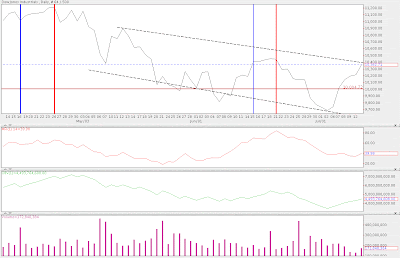These markets, with high volatility/CB intervention, are very hard to make money in; unless you are using options/warrants/other derivatives at a high leverage and trade volatility.
The dow (using chart as an example) bull run ended on 20th Jan 2010 when the it completely dropped out of it's tight range it then subsequently collapsed to 9904 on the 8th of February 2010 then rallied to highs of 11258 on the 26th April 2010; a clearly unstained rally that then collapses to 9810 on the 7th June 2010. The recent 'U-Turn' rally on the 2 July 2010 form a low of 9659 to it's last close of 10362 indicates the widening trading ranges (refer to chart)
Short sellers will struggle to gain a clear sell in a supported/volatile market. Swing traders/ volatility trading will see some gain, but albeit small (unless you have leveraged up your delta risk at a higher % and moving a lot of money around).
We won't see sustained rallies in 2010 or 2011; because the reverse situation (as opposed to the synchronized rallies of 2009) is when Europe/US appears to be improving (and appearances are of course deceiving), China then hits us with the slow down spectra (as the train slows down it may jolt and fall of it's tracks i.e China crash); this counter relation of economic uncertainty will continue thus adding to market volatility.
Note: bull run that finished in Jan 20th 2010 (tight ranges blue/red line)

Note: Current widening/volatility range

No comments:
Post a Comment